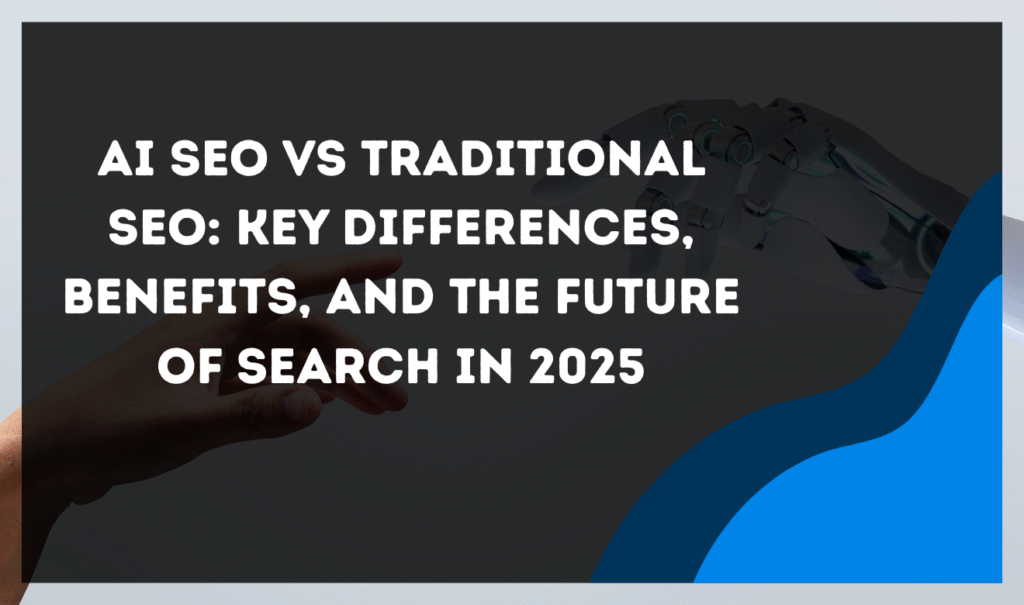AI SEO vs Traditional SEO: Key Differences, Benefits, and the Future of Search in 2025

Introduction to AI SEO vs Traditional SEO
The debate around ai seo vs traditional seo is at the heart of digital marketing today. Businesses want to know if traditional methods still matter or if AI-driven strategies will replace them. The reality is that both have distinct strengths, and together, they can shape a more powerful approach to search visibility in 2025 and beyond.
Search engines are evolving. Users are no longer satisfied with typing keywords and scanning multiple links; they expect AI-driven answers in real time. As a result, marketers must adapt their strategies, blending traditional SEO fundamentals with new AI optimization tactics.
Understanding Traditional SEO
What is Traditional SEO?
Traditional SEO refers to optimizing websites so they rank higher on search engine results pages (SERPs). It’s built on decades of practices that focus on keywords, backlinks, and user-friendly design. In ai seo vs traditional seo, traditional methods remain the foundation.
Core Elements of Traditional SEO
- Keyword Research: Identifying terms that potential customers search.
- On-Page SEO: Using title tags, headings, and meta descriptions.
- Off-Page SEO: Building backlinks to boost authority.
- Technical SEO: Improving crawlability, speed, and mobile usability.
Strengths and Limitations
Traditional SEO builds long-term authority and credibility. However, it can be slow to show results. The average top-ranking page is almost 3 years old, showing that SEO requires patience. In ai seo vs traditional seo, this patience sometimes clashes with the fast, automated outcomes AI can deliver.
What is AI Search Optimization?
Definition and Growth
AI SEO harnesses artificial intelligence to optimize content and strategy in real time. It’s the new frontier in ai seo vs traditional seo, focusing on automation and personalization.
Key Components
- Conversational Search: AI optimizes for natural language queries.
- Automation: Algorithms analyze patterns faster than humans.
- Predictive Analysis: Anticipates trends and adjusts strategies.
Benefits
AI SEO offers scalability, speed, and improved accuracy. For example, AI-driven platforms can analyze millions of queries in minutes to find patterns humans might miss. A Statista report predicts the global AI market will reach $738 billion by 2030, showing the scale of adoption.
AI SEO vs Traditional SEO: Key Differences
Efficiency and Automation
In ai seo vs traditional seo, one of the biggest differences is efficiency. Traditional SEO requires manual research and updates, while AI SEO automates much of this.
Table: Comparing AI SEO and Traditional SEO
| Aspect | Traditional SEO | AI SEO |
| Keyword Strategy | Manual research and targeting | AI analyzes long-tail conversational queries |
| Speed | Slower results (months to years) | Faster adjustments and real-time optimization |
| Scalability | Limited by team capacity | Automated, scalable across thousands of pages |
| Accuracy | Dependent on human input | Data-driven and machine-learned |
| Personalization | Generalized to audience segments | Tailored to individual user behaviors |
Trust and Authority
Traditional SEO leans on backlinks and domain authority, while AI SEO prioritizes trust signals, citations, and context relevance. Both matter, but they weigh differently in ai seo vs traditional seo.
Best Practices for Blending AI SEO and Traditional SEO
Optimizing Content for Both Worlds
To win in ai seo vs traditional seo, marketers must create content that serves both search engines and AI-driven answers.
- Structured Data: Use schema markup to make content machine-readable.
- FAQ Sections: Directly address user questions for AI extraction.
- Conversational Tone: Write in natural language for AI-driven results.
Ensuring Crawlability and AI Accessibility
AI crawlers are expanding. Sites must be AI-ready with updated robots.txt and llms.txt files. Blending AI and traditional SEO means staying machine-friendly without losing human touch.
Case Study: Hybrid Success
A mid-sized eCommerce brand combined structured data with AI-generated content suggestions. Within six months, they increased organic traffic by 32% and appeared in Google’s AI Overviews for multiple high-volume queries. This illustrates the synergy of ai seo vs traditional seo.
Action Plan for AI SEO vs Traditional SEO in 2025
Audit Your Content
Regularly review content to ensure it is optimized for AI. Check for conversational queries, entity mentions, and updated schema.
Fill Content Gaps
Traditional keyword gaps may leave opportunities for AI SEO to exploit. Identify long-tail, question-based queries.
Optimize for Humans and AI
Balance clarity and keyword optimization with conversational tone. Use bullet points and Q&A sections for AI parsing.
Track AI Metrics
Traditional metrics like CTR and SERP rankings still matter. But in ai seo vs traditional seo, you also need to monitor:
- Brand mentions in AI answers
- Appearances in AI overviews
- Citation frequency
Statistics that Matter
According to HubSpot, 75% of searchers never go beyond the first page of results. With AI-driven summaries gaining prominence, appearing in AI answers is the new first-page ranking.
Future-Proofing Your Strategy
The future of ai seo vs traditional seo lies in hybridization. AI SEO delivers speed, automation, and personalized insights, while traditional SEO grounds strategies with authority and credibility. Together, they form a future-proof system.
Brands that fail to adapt risk disappearing from AI-driven search results. However, those that blend both will capture traffic from traditional SERPs and conversational AI engines alike.
The Winning Formula in AI SEO vs Traditional SEO
The key takeaway is clear: don’t choose sides in ai seo vs traditional seo. Instead, integrate both to maximize visibility. Traditional SEO builds the foundation of trust, authority, and consistency, while AI SEO ensures scalability and relevance in a rapidly evolving landscape.
By investing in structured data, conversational content, and ongoing audits, marketers can stay ahead of the curve. Remember—future search isn’t just about keywords or links, it’s about presence where your audience is asking questions. The businesses that embrace this hybrid approach will lead the digital market in 2025 and beyond.
AI SEO vs Traditional SEO — FAQs
1) Do I have to choose between AI SEO and Traditional SEO?
No. The performance play is a hybrid stack. Traditional SEO builds durable authority (links, structure, technical hygiene), while AI SEO unlocks speed, scale, and personalization. Together they maximize visibility across SERPs and AI answer engines in 2025 and beyond.
2) What’s the core delta between AI SEO and Traditional SEO?
Traditional SEO relies on manual research and incremental updates; AI SEO automates discovery, targets conversational queries, and adjusts in near real time. Net-net: AI drives efficiency and scale across thousands of pages; traditional anchors trust and credibility.
3) How do I optimize content for both SERPs and AI answers?
Operationalize a dual-track content model: add schema (FAQ/HowTo/Product), ship FAQ sections, write in natural language, and include entity-rich copy. Maintain clean on-page fundamentals (titles, headings, internal links) so both classic crawlers and AI systems can parse and surface your content.
4) How do I make my site “AI-ready” for expanding crawlers?
Harden technical foundations: keep robots.txt accurate, add an llms.txt policy if appropriate, ensure fast mobile performance, fix 4xx/redirect chains, and keep sitemaps fresh. Structured data plus crawlability = higher odds of inclusion in AI overviews and citations.
5) What KPIs matter in 2025 for AI SEO vs Traditional SEO?
Track the blended scorecard: classic metrics (rank, CTR, impressions, conversions) + AI-era signals (appearances in AI overviews, brand mentions in AI answers, citation frequency). Use these to close gaps on long-tail, question-based queries your legacy keyword set may miss.
Ready to Elevate Your SEO Strategy?
If you’re inspired by this deep dive into ai seo vs traditional seo, now is the time to put insights into action. Whether you’re building authority through traditional methods or scaling fast with AI-driven tactics, the real power comes from blending both approaches strategically.
At AISEOwhiteHatRanker, we specialize in future-proof SEO strategies that align perfectly with the evolving landscape of search. From on-page optimization to AI-ready content, we help businesses not only rank but also get featured in AI-generated results. This means more visibility, more authority, and more leads for your brand.
✅ Why choose AISEOwhiteHatRanker?
- Expertise in both traditional SEO and AI-driven optimization.
- Proven frameworks for ranking in SERPs and AI answer engines.
- White-hat practices that stand the test of algorithm updates.
If you’re serious about staying visible in 2025 and beyond, don’t wait until competitors take the lead. Let’s future-proof your SEO today.
Visit AISEOwhiteHatRanker and discover how we can help you dominate both traditional and AI-powered search.
